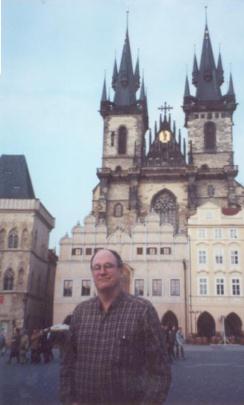This is the eighth and quite possibly the last in a continuing series of my (very unofficial) trip reports about my travels in Central and Eastern Europe. Those of you who have read the other seven Postcard Diaries know that I work as an International Trade Specialist for an Agency of the U.S. Government. My area of specialty is Central/Eastern Europe, and about once or twice a year my travels take me there. But when I first started writing these Diaries back in 1997, before the easy availability of public-access Internet access over there, it was both costly and difficult to stay in touch with the outside world. So instead of expensive telephone calls, I sent one postcard back home every day, trying to pack as much information on it as possible -- I want each one to be not only a stand-alone essay, but also a chapter of an overall larger diary of that trip that would give any readers of the collection a vicarious experience of what it's like to work and travel in Central and Eastern Europe. There was a challenge: be interesting, be entertaining, but above all, be brief! Often not easy, but most every day I was able to find one or two things interesting enough to build a short essay around, even if after a long day, composing that essay wasn't something that I always looked forward to.
Anyway, after reading through this new assembled collection of cards, I've once again added some comments between the postcards for continuity and transition, and to expand on some things where just wasn't enough room in a postcard. As always, I hope you enjoy reading these short essays.
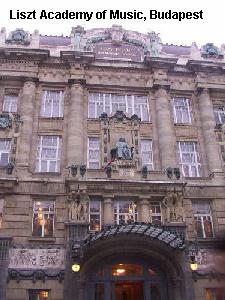 Sunday, April 14, 2002 (Budapest, Hungary)
Sunday, April 14, 2002 (Budapest, Hungary)
Well, once again, the first day of a business trip has created some problems for me
-- Lufthansa or United (I'm not sure which one yet) managed to lose my one checked
suitcase, which contained all of my clothes (except what I'm wearing) and my
toiletries kit. There are several important meetings tomorrow, and I don't have
even a single white shirt to wear, or worse, clean underwear. Even my suit coat was
in there. I'm beginning to wonder if I should have learned a lesson from the
Apollo 13 astronauts 22 years ago -- don't travel on April 13th!
While this wasn't quite as bad as having all my credit cards stolen on the first day of a three-week trip back in the summer of 2000, it was still enough to cast a pall on things and put me in kind of a rotten mood. What saved the day was an evening of Chopin at the Liszt Academy of Music. It was a wonderful piano recital to a very appreciative audience by a very skilled pianist (Endre Hegedüs), and he played just about all of Chopin's "Greatest Hits" -- the "Tristesse" Etude (Opus 10 No. 3, but who's counting?), the "Minute" Waltz (which actually took about a minute-forty to play), the "Raindrop" Prelude (appropriate, due to the rainstorm that blew through the city on my way to the concert hall), and many others. His first encore was the "Heroic" Polonaise, which brought the house down -- pretty good for Polish music, considering we were in Hungary!
Monday, April 15, 2002 (Budapest)
Some good news! Lufthansa found my luggage -- it was waiting for me at the hotel
when I got back there from the day's meetings. At the beginning of the day I
thought I'd have to try to bluff people into believing that a brown flannel shirt
was the latest thing in dress-down business casual. My American Embassy contact,
though, was able to get me out to the open-24-hours Tesco department store before
the first meeting, and I was able to find a white long-sleeve shirt that exactly fit
me for the princely sum of 1,200 forints (about US$4.35). Maybe I should buy
all of my clothes here!?
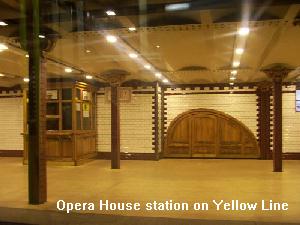 There would have been no way for me to get to the store on my own, even assuming
I'd known it existed, because it wasn't on or even near any of Budapest's three
subway lines, and I didn't have the street address. It's those three subway lines
that make Budapest easily accessible even to foreigners like me; the subways go to
all the places of interest in the city, from the railway stations to the concert
halls, and a three-day pass cost only about US$6.25. Of the three lines, the Yellow
Line (the one that goes straight out Andrassy Street) is both the oldest and the
classiest -- the trains are small and a bit clunky, but the stations are finished in
very nice hardwood oak cabinetry paneling and ceramic tile. A lot of work and care
went into those stations, and as a result, they're treated with respect -- there's
not even a hint of graffiti. It made me almost embarrassed to be down there the
times I wasn't wearing a coat and tie!
There would have been no way for me to get to the store on my own, even assuming
I'd known it existed, because it wasn't on or even near any of Budapest's three
subway lines, and I didn't have the street address. It's those three subway lines
that make Budapest easily accessible even to foreigners like me; the subways go to
all the places of interest in the city, from the railway stations to the concert
halls, and a three-day pass cost only about US$6.25. Of the three lines, the Yellow
Line (the one that goes straight out Andrassy Street) is both the oldest and the
classiest -- the trains are small and a bit clunky, but the stations are finished in
very nice hardwood oak cabinetry paneling and ceramic tile. A lot of work and care
went into those stations, and as a result, they're treated with respect -- there's
not even a hint of graffiti. It made me almost embarrassed to be down there the
times I wasn't wearing a coat and tie!
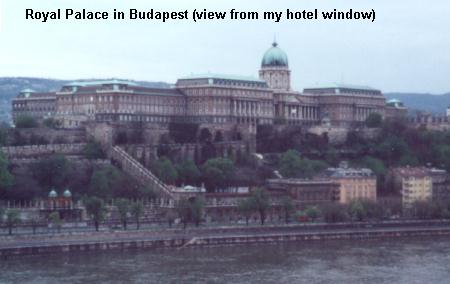 Tuesday night, April 16, 2002 (Budapest)
Tuesday night, April 16, 2002 (Budapest)
It's my last night in Budapest, but I decided not to look for any evening events to
attend. The business meetings ended a bit late and by the time I changed clothes,
having dinner seemed a better bet on how to spend my time. Or maybe it was just
that I didn't see anything listed in the guidebook for tonight that looked better
than, or even as good as the Chopin recital from Sunday night. But I'm sure there
will be some more good events next time I'm here.
Turns out that April isn't the best month for this kind of trip; the people I meet with at the American Embassies set up some great meetings for me (they attended them too), but the spring is a very busy time for them -- there were several small business delegations that came through while I was there, and more the following weeks. I don't think I was quite underfoot, but it did affect the amount of time they had available to spend with me. So next time I go over there, it will likely be in chilly November. I'll remember to bring a coat.
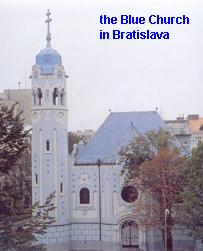 Wednesday night, April 17, 2002 (Bratislava, Slovakia)
Wednesday night, April 17, 2002 (Bratislava, Slovakia)
It was travel day today, and after two intense days of meetings in Budapest, the
leisurely three-hour train ride to Bratislava was quite pleasant. Tomorrow the
meetings will begin again, but this evening was reserved for a walk around the Old
Town of the city as dusk was falling. There are a few sights that are quite
stunningly beautiful that time of day -- turning a street corner and seeing the
"blue church" or the wonderful old Michael's Tower lit against the darkening sky is
something I look forward to, and one of the things that makes me always want to
come back here again.
Bratislava's appeal isn't limited only to its eye-pleasing sights -- it was also the least expensive, by far, of the places I visited this trip. A full-course meal with half a liter of beer at a decent restaurant in the Old Town cost me about 250 Slovak koruna, or just about US$5. Part of the reason for this is that unlike Budapest, Prague, and Warsaw, Bratislava is still pretty much undiscovered by tourists, so the in-town prices are aimed at the locals instead of the foreigners. It's too bad I don't know the Slovak language, because this would be a great place to retire with a U.S. pension -- your money would be, in effect, tripled or quadrupled, with some of the more popular European cities only a relatively short distance away. I think I could probably get used to that!
Thursday, April 18, 2002 (Bratislava)
The four business meetings today filled the day so full that even lunch was squeezed
out of the schedule. On the other hand, it didn't seem all that long a day -- a
two-hour meeting at the beginning of the day seemed to fly by, and when we had to
leave I kind of felt that I still hadn't gathered enough information. The only real
surprise in any of the meetings came in the last one, at the new Slovak Energy
Regulatory Office, where my host there described me to the Chairman of the
organization as "the most well-known American energy expert in Slovakia"! After I
cranked my jaw back shut, I had to concede that, actually, there may be a grain of
truth in that -- I've certainly visited many, many different companies, agencies,
organizations, etc. in all my times here. Either that or else my picture is on a
"Wanted" poster in some Rogue's Gallery there!
That comment got me to wondering exactly how many times I've been to Slovakia. My first trip there was in March 1995, and including this most recent visit I've now been there eleven times (and Poland the same, for that matter, though nobody in Poland has ever had so nice a thing to say about me). Anyway, during many of these eleven trips to Slovakia there have been some pleasant evening music events; the one I went to this trip was a chamber orchestra concert that featured music mostly by baroque composers, including a concerto grosso by Handel. Several of my friends in Bratislava came to the concert too, including one of the engineers (and his wife) from the organization that was hosting me. My friend's wife commented that she liked classical music concerts, but usually only went to one a year -- the same ones my friend brought her to when I was in town. I guess I'm not only a renown energy expert there, I must also be a cultural magnet!
 Friday night, April 19, 2002
Friday night, April 19, 2002
It's finally the end of the work week, and for practical purposes this trip is half
over. Tonight it was time for our traditional pub crawl, but this year was
different. The event has evolved into a dinner, and we spent the entire evening in
just one place -- a very nice but out-of-the way restaurant across the Danube River
in the Petrzalka part of the city. The food was great, the beer excellent, and the
conversation engaging. We all agreed it would be a good idea to do this again next
year.
That dinner was actually another musical event, because there was a Hungarian musician named Zoltan Kozak at the restaurant who played gypsy-style music on a stringed instrument that sounded a bit like a hammered dulcimer. Or, I should say, popular music played gypsy-style, as his repertoire included things like "The Third Man Theme," "Edelweiss," "Never on Sunday," and even the Beatles' "Yesterday." Some of the tunes came across better than others, of course, but overall I'd rate him as a pretty good musician. One of the pieces he played, Beethoven's "Für Elise," was even better than pretty good. I didn't think that transcription from solo piano to any other arrangement would make that piece very listenable, but either the composition is a lot more robust than it would seem to be, or else it was a case of the performance of such a delicate work transcending the limitations of both the musician and the instrument he was playing.
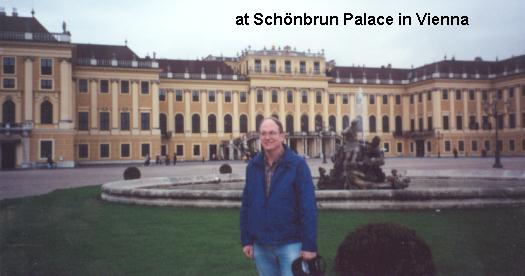 Saturday, April 20, 2002 (Bratislava)
Saturday, April 20, 2002 (Bratislava)
Today is my last day in Bratislava; tomorrow it's on to Prague. Only I didn't spend
all that much time here today -- I took a day trip to Vienna instead (about an
hour's bus ride away). The highlight of the day was a guided tour of Schönbrun
Palace, the summer home of the Austro-Hungarian Emperor Franz-Joseph, and before
that, Maria-Teresa of the Hapsburgs. The place is huge, with hundreds of rooms.
The tour took me through 40 of them, where we could admire the rococo-style design,
the wonderfully-crafted wood-inlay floors, and all the artifacts and furniture
that's been preserved from those eras. It was so impressive that it kind of
overshadowed the rest of the day, actually. Or maybe it was because the day was so
cold and windy, it kind of blew away my enthusiasm for seeing many of the sights of
the city.
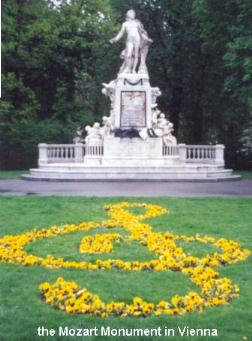 Vienna came across to me as maybe a bit of a disappointment, perhaps due to the
cold weather but maybe also because that many of the fine old buildings in the city
weren't at their best -- many had scaffolding up and were undergoing some kind of
rehab to their facades, while street festivals were going on in front of others.
About the only things that were as nice as I remembered them in my previous visit to
Vienna in 1995 were some of the city's many statues, like those in honor of Mozart
and Strauss. And yet, even some of these were impeded from the public, such as the
one in honor of E. Schindler, which was protected by a wire cage enclosure. It must
be a sign of the times that such measures are necessary. I only hope it's not a
personal sign of the times that this fine city did not really live up to my
expectations.
Vienna came across to me as maybe a bit of a disappointment, perhaps due to the
cold weather but maybe also because that many of the fine old buildings in the city
weren't at their best -- many had scaffolding up and were undergoing some kind of
rehab to their facades, while street festivals were going on in front of others.
About the only things that were as nice as I remembered them in my previous visit to
Vienna in 1995 were some of the city's many statues, like those in honor of Mozart
and Strauss. And yet, even some of these were impeded from the public, such as the
one in honor of E. Schindler, which was protected by a wire cage enclosure. It must
be a sign of the times that such measures are necessary. I only hope it's not a
personal sign of the times that this fine city did not really live up to my
expectations.
Sunday night, April 21, 2002 (Prague, Czech Republic)
Five hours by train and Bratislava magically turns into Prague. I don't know if
Prague really is a magical city, but it sure seems that way. At night, in the
middle of the old Charles Bridge over the Moldau River, you're surrounded by all the
old buildings in various parts of the city, all lit up and glowing golden and green
-- St. Vitus Cathedral and the rest of Prague Castle up on the hill to the west, the
National Theatre to the south, the Rudolfinium concert hall to the north, and
various other cathedrals, churches, towers, domes, and the like here and there
around you. It was like being in the middle of a fantasy movie, but one that
doesn't end after a mere two hours!
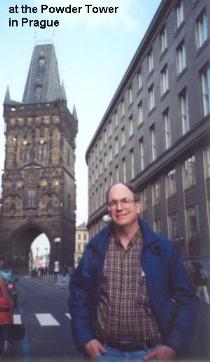 There was a music event (which I attended) at the Rudolfinium that night; the
Philharmonic Orchestra from the Czech city of Hradec Kralové was in Prague
and it played a program of Smetana ("The Moldau" tone poem), Mozart (the "Prague"
symphony, of course) and Dvorák (the famous 9th symphony "From the New
World"). The Dvorák symphony is one of my favorites, and that was only the
second time I'd heard a live performance of it; in the hands of a really competent
orchestra like that one, it lived up to my expectations. Surprisingly, the concert
hall was less than half-filled; perhaps the cost had something to do with it, but
most concerts in Prague are marketed toward the thousands of tourists there instead
of the locals. There are so many nightly concerts in Prague -- more than 20
each evening, not even counting the jazz clubs and piano bars -- that maybe it's
finally gotten to the point where there aren't enough musically-inclined foreigners
like me to go around. In another concert hall a kilometer or so away from the
Rudolfinium, another (lesser) orchestra was giving a performance that same evening
that also featured the same Dvorák symphony, except that this one was being
much more heavily promoted out on the streets. A sign of the times that success in
the classical music concert scene goes to the orchestra that has the best business
plan?
There was a music event (which I attended) at the Rudolfinium that night; the
Philharmonic Orchestra from the Czech city of Hradec Kralové was in Prague
and it played a program of Smetana ("The Moldau" tone poem), Mozart (the "Prague"
symphony, of course) and Dvorák (the famous 9th symphony "From the New
World"). The Dvorák symphony is one of my favorites, and that was only the
second time I'd heard a live performance of it; in the hands of a really competent
orchestra like that one, it lived up to my expectations. Surprisingly, the concert
hall was less than half-filled; perhaps the cost had something to do with it, but
most concerts in Prague are marketed toward the thousands of tourists there instead
of the locals. There are so many nightly concerts in Prague -- more than 20
each evening, not even counting the jazz clubs and piano bars -- that maybe it's
finally gotten to the point where there aren't enough musically-inclined foreigners
like me to go around. In another concert hall a kilometer or so away from the
Rudolfinium, another (lesser) orchestra was giving a performance that same evening
that also featured the same Dvorák symphony, except that this one was being
much more heavily promoted out on the streets. A sign of the times that success in
the classical music concert scene goes to the orchestra that has the best business
plan?
Monday night, April 22, 2002 (Prague)
Already it's my last night in Prague, and I'll be sad to leave here tomorrow. It's
well past the halfway point in this trip, though, and from past experience, the days
seem to start moving faster when you reach that point. Much of the day was spent in
five business meetings, which left me too worn down to want to do more than just do
some walking in the Old Town. Near the Astronomical Clock, one of the people who
advertise upcoming concerts wanted to know where I was from. After I told her, she
said she was from Ukraine; she and her husband had come to Prague seeking a better
life, and even though she was working 14-hour days for 50 koruna (about US$1.50) per
hour, she was convinced she had found it. It was a sobering reminder that even
though the Czechs, Slovaks, and Hungarians are at an economic disadvantage compared
to westerners like me, there are other places that are worse off yet.
The most interesting of the day's meetings was actually none of the five that were on my schedule. The American Embassy had assigned a university student as my translator, and it turned out that her father had once been the Czech Republic's Ambassador to Norway. Partly because of that, she was preparing for a hoped-for career in the diplomatic service herself. She was pleasant company, and going to and from meetings, we had quite a bit to talk about, even including a common interest in classical music. It made a long day seem a lot shorter.
Tuesday afternoon, April 23, 2002 (Prague)
The Prague portion of the trip ended this afternoon, and the taxi to the train
station will arrive soon. I've promised to keep expenses for this trip as low as
possible, and that means taking the overnight train to Warsaw instead of flying
there. I was a bit surprised that for about US$50, I can get a first-class sleeper
couchette, and for double that I can get the whole compartment to myself, which I'm
going to do. I'm rationalizing the extra expense because the total cost is no more
than a hotel room for the night here -- it's like getting the train ride for
free!
Some of my friends consider me a bit of a cheapskate when I travel because of the drastic measures I sometimes take to keep travel costs down. Fact of the matter is that it's never easy to get travel funds -- they all come from an overhead account and any money I use is that much less for everybody else in our organization. I have a pretty good idea how much money I can get approved for a trip, and it's up to me to stretch it as far as I can. If taking a night train instead of spending money for an airplane flight and then a hotel room allows me to extend the trip for an extra day, then I'll do it. On the other hand, there's something fascinating about train travel for me -- it's kind of mesmerizing to watch the countryside roll by, and every so often you can see something unexpected, like an ornate church or the ruins of an old castle on a hill. You don't get that from 25,000 feet in the air.
 Wednesday, April 24, 2002 (Warsaw, Poland)
Wednesday, April 24, 2002 (Warsaw, Poland)
I'm back in Poland for the conclusion of this trip. The ten-hour overnighter from
Prague and the two afternoon meetings were enough to wear me down rather quickly
today, so no evening events tonight. Maybe it's also that directly after Prague,
Warsaw seems a bit of a letdown; instead of a wondrous castle on a hill, there's the
rather forbidding Stalinist-era Palace of Culture and Science that dominates
Warsaw's skyline. But Warsaw's Old Town area is quite nice and there are certainly
a lot of tourists. And, like Prague, the costs here are steadily rising each year.
Both of these cities will be part of the European Union in a few years, but EU
prices will be here sooner yet!
The city actually hadn't changed too much in the year since I'd last been there. Accession to the EU is now scheduled for the beginning of 2004, and that anticipation is one of the driving forces that's affecting the economy there. My personal contribution to the Polish economy this trip included about US$120 spent on amber jewelry at my favorite amber shop (and as usual, the owner recognized me on sight and gave me my usual 10% discount), about US$15 on Polish chocolates (it's some of the best in the world), and, as usual, about a bazillion dollars for Internet access at various public-access Internet cafes. Well, okay, not nearly that much, but still quite a bit -- I spent a lot of time online, and Internet access is becoming so readily available wherever I go that postcard diaries like this one are not needed anymore. This one will be my last, most likely.
Thursday, April 25, 2002 (Warsaw)
The business part of this trip drew to a close today, with my last three meetings.
Two of them were with the people from the American Embassy here, and I'm happy to
say that the chill I'd perceived in my relations with the Embassy now seems a thing
of the past. One of my main Embassy contacts said to me, at the end of the meeting,
"See you next year." I hope he's right!
My problems with the Embassy date back five or six years, and actually weren't my doing at all. The Agency I work for had sponsored a project in Poland back then that went spectacularly bad in almost every way conceivable (I hasten to add that I was not involved in that fiasco), so as a result, none of us were very warmly greeted after that. It's taken this long for most of the suspicion and bad feelings to finally subside. Or mostly so, at least -- there were fewer meetings in the Poland part of the trip than the others because I really had to coordinate what I was doing to a much greater degree than the other places. But hey, it's nice to be wanted!.
 Friday, April 26, 2002 (Warsaw)
Friday, April 26, 2002 (Warsaw)
The final day of this trip was unscheduled, so I took a day trip by train to a place
I hadn't been to since 1993 -- the city of Kraków. I really don't think it's
changed too much in the nine years since my previous time there -- the town square
is as nice as it was before (though more crowded with tourists), there are at least
as many street musicians as before, of all sorts (most of them pretty good), and
they're still at work rehabbing parts of Wawel Castle. I got back to Warsaw about
dinnertime, and found a nice place to eat on Nowy Swiat street that had once been a
hangout of the famous Polish pianist Artur Rubinstein. I didn't manage to get to
any musical events while I was in Poland this time, but having dinner beneath a
signed photograph of Rubinstein was almost as good!
Epilogue
And so the trip came to an end. The trip home was mostly uneventful, except that I
dropped and broke the little teapot I'd bought in Poland as a gift for a friend.
(It happened as I was waiting for the ground shuttle home from the airport.) That
wasn't a very memorable moment, but the disappointment was far outshone by two weeks
of memorable moments prior to that. One of them was at the Chopin concert my
very first night in Budapest; I thought my work could be intense at times, but the
pianist redefined "intensity." When he began his first encore, the grand "Heroic"
Polonaise, you could see that he was in his own little world -- it was just him, the
piano on the stage, and the concert hall surrounding him. By the time he was midway
through the piece, his intensity had increased to the point where it was just him
and the instrument on the stage, all else had ceased to exist. And as his intensity
increased as he neared the end, you could sense that his own personal universe
continued to shrink -- there was only the piano... and then there was only the
keyboard... and then there was only the music. It was all quite remarkable to
witness.
And there was more besides that -- in one of my meetings in Prague I was given a classical music CD as a gift, and when I remarked how grateful I was because I very much liked classical music, the man gave me two more. I sometimes hand out gifts at meetings where I want to be remembered, but this time the roles were reversed; if he was trying the same thing, it worked! And near the very end of the trip, when I was at my favorite amber shop in Warsaw, as usual I practiced my fractured Polish on the lady who owned the shop, and as usual she politely pretended that I wasn't mangling the language. It had been nearly a year since I'd last been there, and both she and I knew that it might be at least that long before I was back there again. So when it was time to leave I reluctantly bid her do widzenia ("good-bye"), but she didn't seem ready to accept that. "No," she replied, "not do widzenia. Do zobaczenia." ("Until later") "'Do zobaczenia' doesn't mean good-bye."
She's right, you know...
